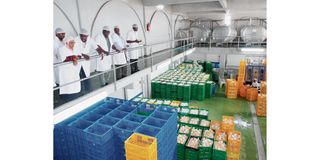Small companies in Tanzania, S. Africa ‘missing out on agroprocessing’

A tour of a milk processing plant. The inclusion of small and medium entreprises in the processing of agricultural produce remains marginal in both Tanzania and South Africa, a comparative study has shown. The research studied maize, dairy and citrus processing. It identified adverse market structures and inadequate policy intervention as other common factors which undermine the inclusion of SMEs. PHOTO | FILE
What you need to know:
- Market concentration is a major impediment for South Africa, while weak organisation, low capitalisation and unstructured market impede Tanzanian SMEs
Dar es Salaam. The inclusion of Small and Medium Enterprises (SMEs) in the processing of agricultural produce remains marginal in both Tanzania and South Africa, a comparative study has shown.
Market concentration is cited as a major impediment for small players in South Africa, while weak organization, low capitalization, and unstructured market have been failing Tanzanian SMEs.
The research across the two countries with diverse economies, examined the processing of maize, dairy, and citrus. It picks out adverse market structures and inadequate policy intervention as other common factors undermining the inclusion of small enterprises.
Supported by the UK Economic and Social Research Council (ESRC), the study involved Tanzania’s Economic and Social Research Foundation (ESRF), the Centre for African Studies (CAS) at the University of Edinburgh, and the Centre for Competition, Regulation and Economic Development at the University of Johannesburg, South Africa.
Small firms are reported to have significant presence in maize milling and dairy processing in Tanzania and, albeit to a lesser degree, citrus processing in South Africa. SMEs handle about 90 percent of maize milling in Tanzania, but lack of capital limits their ability to purchase adequate amounts of quality maize from farmers, failing to compete with the well-financed and networked large scale processors. In contrast, in South Africa only 20 large-scale firms accounted for 80 percent of milled maize and dominate the market. The structure of value chains in that country is seen as adverse for small players, despite radical reconfiguration to favour SMEs in the 1990s.
It is feared market concentration may push the small firms out of business.
There is also more SMEs participation in dairy processing in Tanzania than in South Africa but the Tanzanian small firms applied limited value addition. Only 14 percent of the 2.5 billion litres of milk produced annually in this country is processed, mainly by about 80 micro dairy processing firms handling less than 5,000 litres a day. There are three big companies with the capacity to process more than 50,000 litres daily each.
In Tanzania, 90 percent of the milk is produced by smallholder cattle keepers and sold directly to households through hawkers and vendors; while in South Africa, 80 percent of the milk produced is marketed through formal channels by 130 processors, five of who command 60 percent of the sales.
With regard to citrus farming and processing, the comparative study draws two parallels. While the crop is grown at a small scale in three regions in Tanzania, with insignificant industrial processing, South Africa’s citrus production and processing is a vibrant business, the country being the second-largest global exporter.
The study found that the fruits produced in Tanzania are of mixed variety with poor lactose content unfit for high-value juice processing. The situation is attributed to the weak contribution of Research and Development on the crop as well as extension service to citrus farmers.
There is, therefore, no strong SMEs participation in fruit processing as the product is sold at the farm gate to middlemen who take it to towns for use as table fruits or resell to agents of Kenyan processors for export.
On the other hand, South Africa’s processed and fresh citrus is marketed locally and exported to the EU and the regional market. As with maize and dairy, the industry is dominated by large companies, but there is notable participation of smaller players, mainly black farmers, who are also exporters.
Technologically, the small enterprises engaged in maize milling in Tanzania rely on the outdated hammer mills while some of the medium-scale, and all large-scale millers use roller mills, considered modern and more efficient.
The largely unbranded products from SMEs are marketed through medium and small street shops and markets, whereas the large millers, which produce in bulk and at lower per unit costs, dominate the market in big cities of Dar es Salaam, Mwanza, Mbeya and Dodoma.
All large-scale millers comply with requirements for micro-nutrients fortification of their products and they are regularly monitored for adherence to hygiene and safety requirements. Such measures are less stringently followed by small and medium scale millers. Some of the products by large-scale millers are exported to neighboring countries.
According to the research findings, large players in the South African dairy industry employ anti-competitive tactics and buyer power abuse, which tend to exclude small processors. Supermarket chains, which handle a major volume of dairy products sales, were also found to impose terms that were inhibitive to small enterprises.
The research shows that low milk production undermines SMEs participation in dairy processing in Tanzania and recommends upgrading of the national dairy cattle herd, which has only three percent improved breed, to raise milk production. Formal channels of milk trading should be established and business regulatory reforms adopted to better organize the sub-sector.
It was found that Tanzania had noticeable policy support in favour of maize production, but paid little or no attention to SMEs role in processing. The report calls for a comprehensive approach by both Tanzania and South Africa to enable small enterprises to upgrade technologically and economically. Strong development banks would help with capitalization in Tanzania.
However, policy interventions in favour of SMEs in South Africa is bound to be more complex and costly.
In terms of stakeholder organization, whereas South African citrus growers have a strong association and use the grower power to bargain with stakeholders for better terms of trade, Tanzanian growers were found to be weakly organized.
The report calls for state intervention to revive citrus production in Tanzania by re-establishing the institutional framework needed to organize and develop the sector.
The comparative study focused on factors determining innovation and inclusion in agro-processing, challenges to the promotion of SMEs participation in the process, and how to use the findings to support industrial policy-making at the national and regional level.
The research findings were presented in a webinar at the end of last August with discussants from the Copenhagen Business School, London School of Economics, and universities of Oxford, Manchester, Roskilde, Edinburgh and Johannesburg among others.





